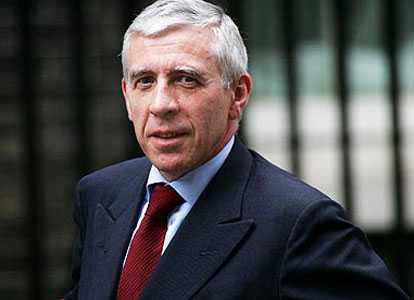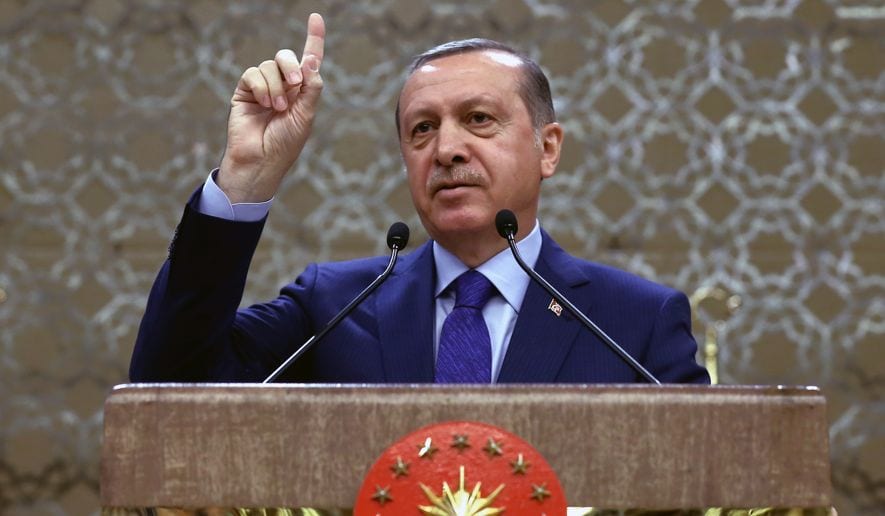By David Warren, Ottawa Citizen
The greatest threat to the world’s peace, at this moment, comes from a man named Recip Tayyip Erdogan. He is the prime minister of Turkey, at the head of the Justice and Development Party (“AK,” from the Turkish). A former mayor of Istanbul, he was arrested and jailed when he publicly recited Islamist verses (“the mosques are our barracks, the domes our helmets, the minarets are our bayonets,” etc.), in defiance of the old secularist, Ataturk constitution, which made it an offence to incite religious and racial fanaticism.
Erdogan’s credentials as an anti-Semite, but also as an anti-Communist, were established from his school days. He came from an observant Muslim family, and while nothing he says can be taken without salt, he claims an illustrious ancestry, of fighters for Turkish and Ottoman causes.
He is an “interesting case” in other respects. His post-secondary education was in economics; he is a very capable technocrat, and under his direction the Turkish economy was rescued. He is a dragonslayer of inflation, and public deficits; he took dramatic and effective measures to clean up squalor in the Turkish bureaucracy, and as the saying goes, “he made the trains run on time.”
Erdogan is also a “democrat,” who has no reason not to be, because he enjoys tremendous and abiding domestic popularity. The party he founded came to power by a landslide, and has been twice re-elected. (He had a stand-in for prime minister at first, for he was still banned from public office.) There are demographic reasons, too, why Turkish secularism has been overwhelmed by Turkish Islamism. The Muslim faithful have babies; modern secularists don’t.
The “vision” of this politician, which he can articulate charismatically, is to combine efficient, basically free-market economic management, with a puritanized version of the religious ideals of the old Ottoman Caliphate. (Gentle reader may recall that I am allergic to visionary and charismatic politicians, who operate on the body politic like a dangerous drug.)
Erdogan’s vision has turned outward. His strategy has been to seek better economic integration with the West, while making new political alliances with the East – most notably with Iran. He now presents Turkey as the champion of “mainstream” Sunni Islamism, while trying to square the circle with Persian Shia Islamism. This could still come to grief over Syria, where the Turks want Iran’s man, Assad, overthrown, and the Muslim Brotherhood brought into a new Syrian government.
Turkey’s military was the guarantor of pro-western Turkish secularism, under the Ataturk constitution. With characteristic incomprehension of the consequences, western statesmen supported Erdogan’s efforts to establish civilian control over the generals – our old NATO friends. By imprisoning several senior officers on (probably imaginative) charges of plotting a coup, Erdogan was able to induce the entire Turkish senior staff to resign, last month.
They did this because they had run out of allies. Hillary Clinton and company hung the only effective domestic opposition to Erdogan out to dry. Turkey’s powerful, western-equipped military is now entirely Erdogan’s baby, and the country’s secularist constitution is a dead letter. Erdogan, the Islamist, now has absolute power.
It was he who sent the “peace flotilla” to challenge Israel’s right to blockade Gaza (recognized under international law and explicitly by the U.N.). He made the inevitable violent result of that adventure into an anti-Israeli cause célèbre. He has now announced that the next peace flotilla will be accompanied by the Turkish navy.
This will put Israel in the position of either surrendering its right to defend itself, or firing on Turkish naval vessels. There is no way to overstate the gravity of this: Erdogan is manoeuvring to create a casus belli.
He has made himself the effective diplomatic sponsor for the Palestinian declaration of statehood next week – from which much violence will follow. Every Palestinian who dies, trying to kill a Jew, will be hailed as a “martyr,” with compensation and apologies demanded.
He has been playing Egyptian politics, by adding to the rhetorical fuel that propelled an Islamist mob into the Israeli embassy in Cairo last Friday. He is himself in Cairo, this week, on a mission to harness grievances against Israel, in the very fluid circumstances of the “Arab Spring.” For action against this common enemy is the one thing that can unite all disparate Arab factions – potentially under Turkish leadership.
The West is just watching, while Erdogan creates pretexts for another Middle Eastern war: one in which Israel may be pitted not only against the neighbouring states of the old Arab League, but also Turkey, and Iran, and Hamas, and Hezbollah.
This is what is called an “existential threat” to Israel, unfolding in live time. It could leave the West with a choice between defending Israel, and permitting another Holocaust. In other words, we are staring at the trigger for a genuine world war. With Recip Erdogan’s twitching finger on it.
David Warren’s column appears Sundays, Wednesdays and Saturdays.
© Copyright (c) The Ottawa Citizen
via The man who could trigger a world war.
 Israel should have apologized to Turkey for its deadly raid on the Mavi Marmara aid ship, but instead allowed relations to deteriorate, according to United Kingdom’s former Foreign Secretary Jack Straw.
Israel should have apologized to Turkey for its deadly raid on the Mavi Marmara aid ship, but instead allowed relations to deteriorate, according to United Kingdom’s former Foreign Secretary Jack Straw.





